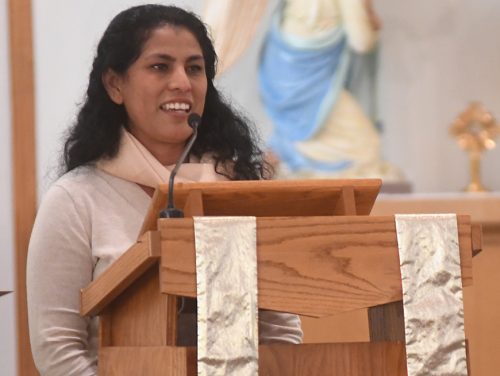The Catholic Campaign for Human Development, the anti-poverty program of the U.S. Catholic Church, was organized in 1970 to break the cycle of poverty, help low-income people participate in decisions that affect their lives and strengthen all community members, especially those on the margins. CCHD strives to involve Catholic parishioners in supporting, educating and participating in grassroots social change. This year marks its 50th anniversary.
Two parishioners at St. Joseph in Waite Park, Ma Elena Gutiérrez and Patty Keeling, have been involved in Asamblea de Derechos Civiles (Assembly for Civil Rights). The CCHD-funded organization started in 2006 in the Twin Cities; Ma Elena co-founded the group in Waite Park and St. Cloud. More recently, the two women and other grassroots leaders organized Fe y Justicia (Faith and Justice), geared to the needs of the Latino community within the St. Cloud Diocese.

“When I moved to Minnesota,” Ma Elena said, “there was no place locally where Latinos could get help. If they didn’t know English, it was especially hard. I educated myself, going to meetings in the St. Cloud area and meeting with people from the Cities. I learned about the people representing us in public office and how to lobby state and the national legislators. Then I’d teach people to tell their stories and explain why a bill should be passed. Through sharing testimony with representatives, we are able to show how anti-immigrant and racist policies harm our families and community.”
CCHD funds enabled her to develop those leadership skills.
Patty had felt called by God to work with the marginalized. When she heard about Ma Elena and other grassroots leaders combating discrimination at a mobile home park, she was ready to participate.
“Once I was a quiet person who participated in things but never led them,” Patty said. She attended Gamaliel week-long trainings (paid, in part, through CCHD grants) and learned to meet with individuals, conduct meetings and develop relationships with leaders, media, law enforcement, businessmen and educators.
Through funds granted by CCHD, Asamblea has worked on housing issues, supported DACA (Deferred Action for Childhood Arrivals) candidates, citizenship and immigration reform and led informational sessions on voter registration and organized candidate forums.
The coronavirus deeply impacted greater Minnesota’s population of immigrants who work at meat-packing plants. All workers, including Somali workers, desperately needed help.
“Many didn’t get stimulus checks, and got behind with rent, food and bills,” Ma Elena said. “If someone got COVID, the whole family stayed home. People called us night and day for a month. We answered questions, brought food to homes and helped with medicine, rent and emergencies.”
Patty said, “We were stretched far across the state to serve members, but locally we had different needs and began to look at other options to serve. With much prayer and contemplation, we formed Fe y Justicia for the specific needs of the Latino immigrant community in central and greater Minnesota.”
One current focus of Fe y Justicia is the breakup of families when the authorities take undocumented workers to the Sherburne County Jail.
With an average of 10 percent of community members in the St. Cloud Diocese in poverty, more than 38 million people in poverty in the U.S, with another 100 million in “near poverty,” the need for CCHD is as important as ever, supporters say.
“We continue Catholic social teachings as disciples of God,” Patty said. “Faith, hope and love of God and our neighbors keep us forging forward. We thank God for such phenomenal support from CCHD.”
This year’s parish collection in support of CCHD is Sept. 19-20.






















